A Pipeline Eco Engineer Protests
Air Date: Week of April 20, 2018
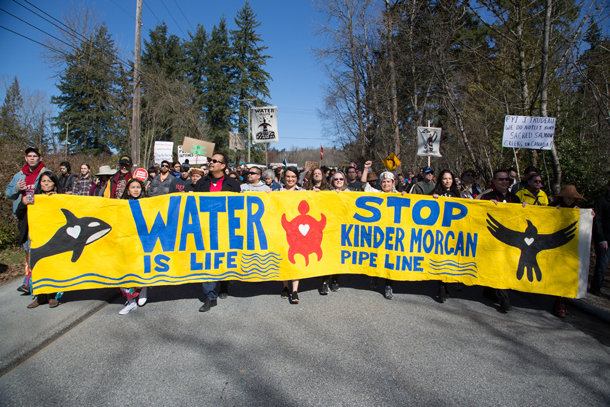
On March 10th, 2018, thousands marched in Burnaby, B.C., just outside Vancouver, to protest Kinder Morgan’s Trans Mountain Expansion project. (Photo: Zack Embree, Flickr CC BY-NC-SA 2.0)
Romilly Cavanaugh once worked as an environmental pipeline engineer for Trans Mountain, a unit of Kinder Morgan that’s now trying to expand a Canadian tar sands oil pipeline. After she quit she became alarmed by global warming, and on March 20 she joined 200 protestors trying to block pipeline construction. She now awaits trial for criminal contempt of court. The pipeline would nearly triple oil sands flowing to the Port of Vancouver and would cross First Nations territory. Worried by strong opposition, Kinder Morgan wants government legal and financial guarantees to continue. Ms. Cavanaugh told host Steve Curwood about her convictions on the need to curb climate-changing gas emissions, protect the land and water from oil spills, and to respect Indigenous rights.
Transcript
CURWOOD: It’s Living on Earth, I’m Steve Curwood. There’s opposition to oil sands pipelines north of the border, as well. Activists in British Columbia are trying to stop Kinder Morgan’s Trans Mountain Expansion Project, which would nearly triple the flow of oil sands crude from Alberta to the port at Vancouver, Canada. The protestors say the project endangers the climate. And members of First Nations are contesting the pipeline in court, because half of it crosses their unceded territory. They say a spill could be disastrous for the local environment that they depend on for traditional foods and medicines.
Some 200 protestors have been arrested at the gate of Kinder Morgan’s Burnaby Terminal near Vancouver. The arrests were mostly peaceful.
[SOUNDS OF INDIGENOUS SINGING AND DRUMMING]
CURWOOD: Faced with this intense public pressure, Kinder Morgan recently threatened to scrap the $5.8 billion (US) project unless there’s assurance by the end of May that the legal challenges will be resolved. Canadian Prime Minister Justin Trudeau is vowing federal cash and more.
TRUDEAU: …we are actively pursuing legislative options that will assert, plus reinforce the Government of Canada’s jurisdiction in this matter, which we know we clearly have. We are going to get the pipeline built.
CURWOOD: Prime Minister Trudeau says the project is in Canada’s national interest. But a former environmental engineer who worked for Trans Mountain – now part of Kinder Morgan -- disagrees, and her protests at the Burnaby Terminal site led to her arrest and criminal charges. Her name is Romilly Cavanaugh. Welcome to Living on Earth!
CAVANAUGH: Thank you so much it's a pleasure to be with you.
CURWOOD: So, tell me -- you were trained as an environmental engineer; what exactly was your training?
CAVANAUGH: Yes that's correct. So I did my degree at University of British Columbia and I've been working for the last thirty years as an environmental engineer. So my primary focus when I worked at the pipeline was to respond to spills, to clean up spills, and also to work on obtaining permits for new construction. So there was some expansion that was done when I was there back in the ninety's, but it was on a much smaller scale than what's planned currently by Kinder Morgan which would take the throughput from three hundred thousand barrels per day to eight hundred ninety thousand.
CURWOOD: So you worked with them for five years; what changed about your perspective, why did you stop working for Trans Mountain?
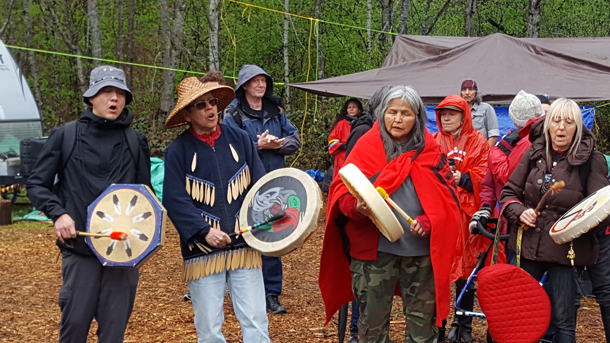
Members of First Nations sing and drum at the protestors’ training camp near the Kinder Morgan Burnaby Terminal. (Photo: Romilly Cavanaugh)
CAVANAUGH: Well I had reservations about working there from the beginning because there had already been the Exxon Valdez spill in 1989 and I started a couple years after that. So I already had some concerns about the industry in general; but I also had the feeling that if I worked within the environmental department we could at least do the best job possible in terms of environmental protection. So when we would apply for permits through the government we would look for rare and endangered species of animals and plants anywhere in the construction area. We would attempt to have as little disturbance as possible to rivers and creeks from construction; we would deal with issues like noise and dust. So to the best of our ability, minimize the impacts. But ultimately the industry is a dirty industry, we need to phase it out. There was a very funny cartoon that someone showed me when I worked there, and it was a cartoon of a pipeline with a valve, and there was a worker standing there with his hands on the valve. And beside him was a person who had a label underneath saying "An environmental manager at a pipeline company." And in one bubble he was saying, "Open the valve," because of course a company has to make money; and in the second bubble he was saying, "Close the valve," because there's really no way to have zero impacts from a fossil fuel industry. It is by its very nature a polluting industry. So that kind of summed up the entire experience I would say.
CURWOOD: [LAUGHS] Yeah I guess so!
CAVANAUGH: [LAUGHS] So the projects were pretty much rubberstamped from my perspective, so at some point it just became a very difficult place to work for me based on my convictions about environmental protection and Indigenous rights.
CURWOOD: Today, you don't work at Trans Mountain.
CAVANAUGH: No.
CURWOOD: You are working to stop the Trans Mountain pipeline expansion; why?
CAVANAUGH: That's correct. Because we're in a climate crisis; now is absolutely the wrong time to be investing in any more fossil fuel infrastructure. We should be moving away from this industry as quickly as possible at this point. So to be increasing the throughput on that pipeline by almost three times is just absolutely the wrong decision. So that's the main issue because it is a global issue, but there's also risks associated with the spill from the tankers. So, the tanker traffic comes from Burnaby, which is a suburb of Vancouver, but then passes basically through the city center of a metropolis with two million people, and then goes out into the Salish Sea where we have the endangered Orca whales. So there's the risks of spills as well that could impact our community as well as the environment. And there's just inadequate equipment available to deal with that, we've seen that with the Gulf of Mexico spill, the Deepwater Horizon, which did close to six billion dollars in damage to the economy there -- tourism, fisheries and other industries -- and widespread damage to the habitat there as well. So if we look back to what happened with the Exxon Valdez, a quarter of a million sea birds died; more than three thousand marine mammals were killed; billions of herring and salmon eggs were smothered. And for twenty years the local people fought to try to get restitution for the impacts to their livelihood. So the oil and gas industry doesn't want us to think about how they impact other industries or other communities; they just want Canadians to focus on job creation within the oil patch. And then there's the whole issue of indigenous rights. So there's just so many issues associated with this project.
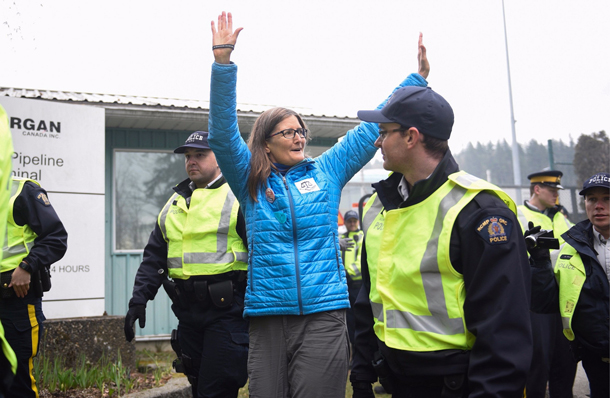
Mounties flank Romilly Cavanaugh as they escort her to a processing area for protesters arrested at the Burnaby Terminal, March 20th, 2018. (Photo: Rogue Collective, Flickr CC BY-NC-SA 2.0)
CURWOOD: The company says that they have robust technology for preventing and cleaning up spills.
CAVANAUGH: [LAUGHS] That's just not correct. So in the 1990s, when I was working at the pipeline, if there was a major spill into a marine environment, a successful outcome was for them to be able to contain about ten percent of the oil that was spilled. Very little has changed since then. So they're using pretty much the same technologies, some of the skimming equipment has improved. But they essentially will try to corral the oil using booms at the surface. It's basically almost like a rope for example, with a skirt underneath it, so if the oil doesn't remain at the surface there's no way for them to collect it. A portion of it will always be mixed into the water itself, and with this heavy oil that's coming from Alberta, some of it will sink to the ocean floor. They have no technology whatsoever for anything that doesn't remain on the surface. And then what we saw with the Gulf of Mexico was they tried to boom off the most sensitive habitats like the marshlands, and with wave action and with winds, the oil goes up and over the booms and ends up in those same areas that they're trying to protect. So the equipment is grossly inadequate.
CURWOOD: Why in your view is the Trans Mountain pipeline expansion such a threat to the global climate system?
CAVANAUGH: The oil sands itself is one of the biggest producers of greenhouse gas emissions in the world. It is a massive industrial site that covers two million acres of forest land. So any additional capacity to have oil transported from Alberta I see as a detriment to climate change.
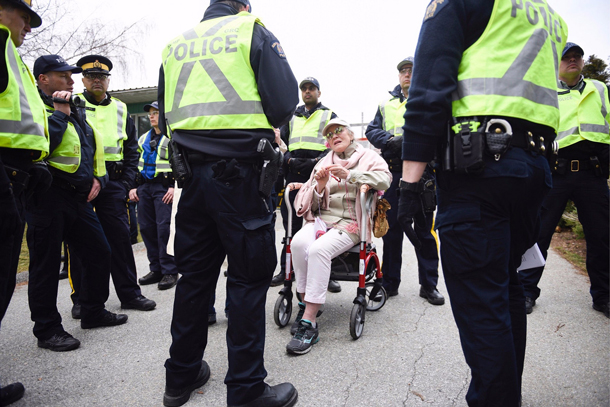
Nearly all of the arrests in protest of the Trans Mountain Expansion Project have been peaceful. Above, one woman who was arrested the same day as Cavanaugh sat on her walker, knitting. (Photo: Rogue Collective, Flickr CC BY-NC-SA 2.0)
CURWOOD: Romilly, walk me through what happened to you on the day you were arrested protesting this pipeline.
CAVANAUGH: So we started off in a soccer field that was close to the Kinder Morgan facility; we gathered there, we started to do our training, we made a commitment to nonviolence, to no weapons, no drugs, no alcohol. And then we started walking through a trail that went through the forest. The Indigenous leaders were at the front, there was drumming and singing and it was this very beautiful and peaceful moment as we walked there. We could hear the birds singing; people commented that there was a combination of sounds -- the sounds of nature and the sounds of construction, because they were taking the trees down at that point -- and as we walked the drumbeat, I've been told, is meant to slow down your heart rate and your heart will be in unison with that beat. So there's a very peaceful feeling that comes over you. As I started walking I thought I don't know if I can do this or not. I've never been arrested before; what will the ramifications be; am I really going to jail? And then as I walked it became very clear I have to do this. And so at that point if I had any doubt about getting arrested, if it was really the right thing to do, all the fears about that went away. So the first group went up to the gate and they used the zip ties to attach themselves to the gate. And then once the police arrived they read out the court injunction, letting people know exactly what it said, and gave them ten minutes to decide if they wanted to remain.
CURWOOD: So at this point you're one of those people who hasn't tied herself to the gate, but you're just standing there.
CAVANAUGH: That's right. So we went up in groups; there were six people to start with. They were arrested, and when that happened a line of police stood in front of the gate so that we couldn't get through. So the organizers had said, cross your hands across your chest, turn your body sideways to the police and try to walk in between the gaps, but say to them "we're passing you, we're just trying to get to the gate;" and the police said "you are not passing." [LAUGHS] So at that point we were told to just sit down; we certainly don't want to get into any kind of a scuffle with the police. So we sat in a row in front of them and one by one they came and arrested each person.
CURWOOD: And so they arrest you and then they take you where?
CAVANAUGH: They took us to a temporary processing area. So they had tables and chairs set up on a trail beside the property. It was interesting because the officer who arrested me -- I said, "well my mom is going to freak out when she sees me on the news," because there was quite a bit of media there the day that I was there. And I said "she thinks I'm at work, so I think she's going to be quite surprised." And he said to me, "At least you stood up for what you believed in." Which I thought was really wonderful, because not all of the police there are in support of this project, but they are doing their job and they're required to be there. So I thought that was an interesting moment.
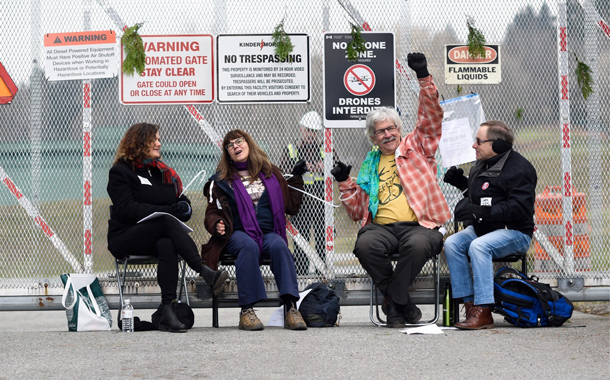
Protestors “chained” themselves to the gate at one entrance to the Burnaby Terminal site using large zip-ties. (Photo: Protect the Inlet)
CURWOOD: So if you were to explain this to, say, a young person, who doesn't really understand how governments and companies and all this work, how would you explain what you did that day and how you feel about it?
CAVANAUGH: Well the reason that I decided to get arrested is because I've seen over and over again that our government is making the wrong choices for the planet and for the people. And when I was younger I really trusted them, naively. In fact when I worked at the pipeline company I'd started to hear about climate change; it wasn't very well known at that time, certainly amongst people in the public. And I really felt the government will take care of it. Because it's in the best interest of the people, and in the best interests of the planet, and isn't that their job? And then decades went by where nothing was happening, and it became more and more clear, it's been thirty years now since the United Nations set up the International Panel on Climate Change. There's thirty years of very hard scientific data backed up by the vast majority of climate scientists around the world. There's consensus on this issue. But the industry did a really good job of muddying the waters, delaying action. They used the same tactics that the tobacco industry used to try to delay action related to cancer being caused by smoking. So as I saw that, and each year was passing, more and more poor decisions were being made by the government like the approval of this project; and I thought, this is ridiculous! If we want change we have to stand up. In a peaceful way, and with knowledge and with commitment. And what's beautiful about this movement is it's bringing people together from lots of other movements as well. There was a representative there from Black Lives Matter. There's people there who are transgendered. There's people there in wheelchairs and with walker; of all races and of all ages; there's youth and there are seniors. There was an elderly woman sitting on her walker, the little chair that the walker has, knitting -- with about twenty police around her. [LAUGHS] You know so these are peaceful, concerned, passionate people and it's wonderful to see that this movement is growing, and that it's very inclusive. So yeah I just realized at that point that it's naive to sit around waiting for the government to do the right thing. If we want the right thing to happen we need to make it happen.
CURWOOD: Back at the Paris climate meeting, I saw Prime Minister Justin Trudeau enthusiastically embracing the process and the Accord and committed to curbing Canada's greenhouse gas emissions. How do those affirmations strike you in view of his approval of this Trans Mountain pipeline to move the tar sands to market?
CAVANAUGH: Well it just doesn't ring true at all. We are very disappointed in Canada, with what has proceeded since that time. So in the past we had Prime Minister Stephen Harper, who was from Alberta. He was very pro oil and gas; we had no expectation that he would take any action on climate change. But then when Trudeau was elected, the people who are concerned about these issues had a sigh of relief and thought, OK now we're on the right track. So he said many beautiful things in Paris, but you can't have that and continue to expand the oil sands, it doesn't make any sense. We have one of the highest per capita greenhouse gas emissions in the world because of the oil sands, because it's such a huge emitter. And I'm not anti-industry and I'm certainly not anti-jobs; and what I believe is those people as well don't really have a future. This is a dying industry, whether it dies in the next five, ten or twenty years, or if we burn every last drop of oil on this planet and really destroy the climate, it will end. It's not a renewable resource. So where is the plan for them? To move forward, to transition over to the clean energy economy?
CURWOOD: Well Romilly, large multinational corporations can be pretty tough to deal with; you and your fellow protesters are up against the company and the approval of the Prime Minister. How hopeful do you feel about the ability for you and your colleagues to make a difference?
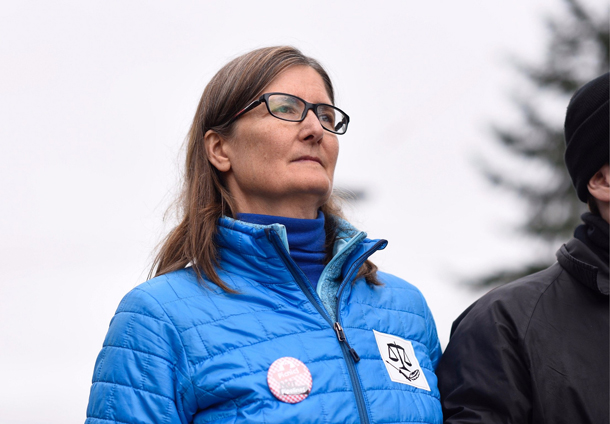
Romilly Cavanaugh is a former Trans Mountain employee who is protesting the Trans Mountain Expansion Project. (Photo: Rogue Collective, Flickr CC BY-NC-SA 2.0)
CAVANAUGH: Well that's a really good question; it does seem very much like a David and Goliath kind of struggle. But I am very hopeful, because we've seen other projects in Canada cancelled, like the Northern Gateway project which would have gone through northern B.C. And would have had a similar impact as what we're seeing now with the Kindred Morgan project. So there's several court cases that are still pending; the Indigenous communities in B.C. Have unceded territory, which means that their territory was never signed over to the English government when the colonialists came here. So the pipeline would be going across unceded territory. But the group that's leading this protest is the Tsleil-Waututh Nation, which is just across the water from where the tanker loading facility would be. And they rely on the fish and the shellfish and a clean environment for their survival, so they're very concerned about protecting the land and the water, which to them is not just a source of sustenance, but it's sacred. So they have a right to protect their land and their water. And the provincial government has also started a court case against the federal government to say that they're concerned about what will happen with the heavy oil if there is a marine spill. There's been inadequate science, inadequate amount of research to determine what the fate would be of that oil. So there are multiple things that could happen to shut this project down; another one is that the investors could just throw their hands up in the air and decide it's not worth it because I don't think they realize just how dedicated the protesters are. So we've had protests here in B.C. But we've also had them all across Canada. And it seems very much like a movement, it seems to be building momentum. So it could go either way but I'm hopeful that that we will be successful with our protests.
CURWOOD: Romilly Cavanaugh is an environmental engineer and now an activist based in Vancouver, Canada. Thanks so much for taking the time with us today.
CAVANAUGH: It was my pleasure. Thank you for having me on your show.
Links
National Observer: “In a packed courtroom, Kinder Morgan pipeline protestors face charges”
The Star: “Trans Mountain pipeline ‘will be built,’ Trudeau says”
Vice News: “Trudeau’s Trans Mountain fight isn’t with B.C., it’s with First Nations”
Protect the Inlet is the First Nations-led group organizing the Trans Mountain protests
About the Trans Mountain Expansion Project
A West Coast Environmental Law explanation of the court challenges to the Trans Mountain pipeline
Living on Earth wants to hear from you!
Living on Earth
62 Calef Highway, Suite 212
Lee, NH 03861
Telephone: 617-287-4121
E-mail: comments@loe.org
Newsletter [Click here]
Donate to Living on Earth!
Living on Earth is an independent media program and relies entirely on contributions from listeners and institutions supporting public service. Please donate now to preserve an independent environmental voice.
NewsletterLiving on Earth offers a weekly delivery of the show's rundown to your mailbox. Sign up for our newsletter today!
 Sailors For The Sea: Be the change you want to sea.
Sailors For The Sea: Be the change you want to sea.
 The Grantham Foundation for the Protection of the Environment: Committed to protecting and improving the health of the global environment.
The Grantham Foundation for the Protection of the Environment: Committed to protecting and improving the health of the global environment.
 Contribute to Living on Earth and receive, as our gift to you, an archival print of one of Mark Seth Lender's extraordinary wildlife photographs. Follow the link to see Mark's current collection of photographs.
Contribute to Living on Earth and receive, as our gift to you, an archival print of one of Mark Seth Lender's extraordinary wildlife photographs. Follow the link to see Mark's current collection of photographs.
 Buy a signed copy of Mark Seth Lender's book Smeagull the Seagull & support Living on Earth
Buy a signed copy of Mark Seth Lender's book Smeagull the Seagull & support Living on Earth

